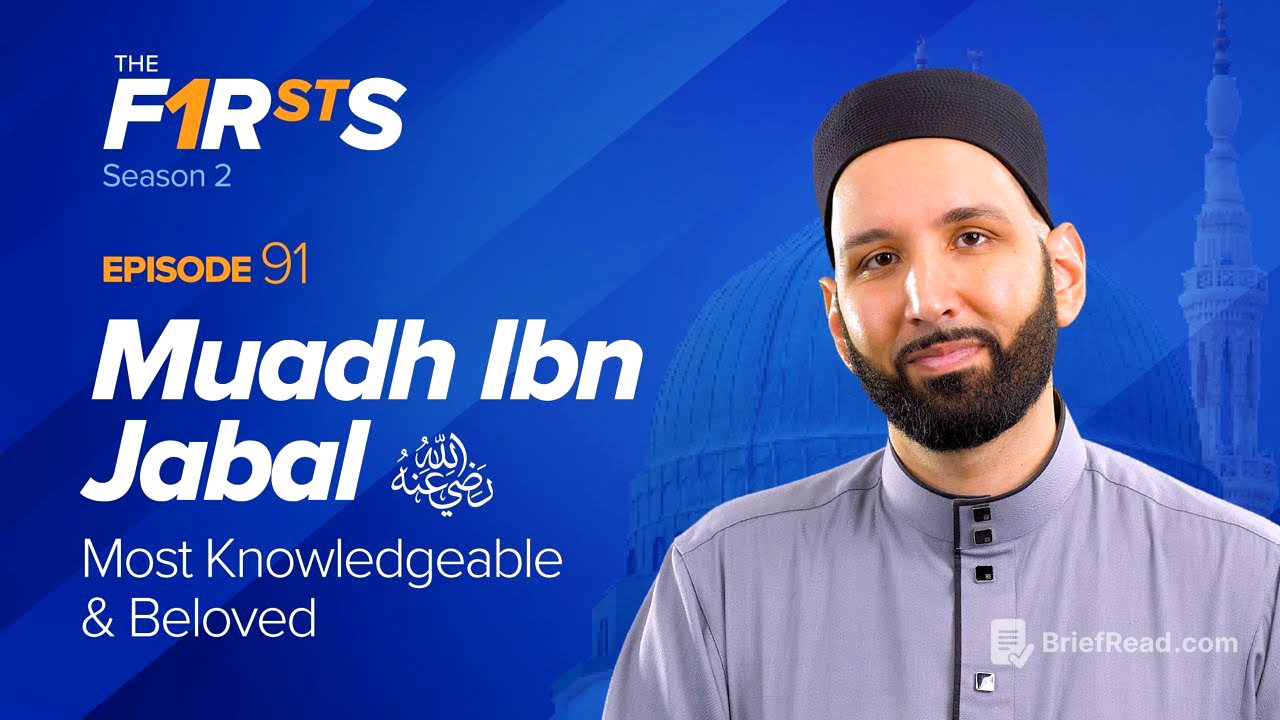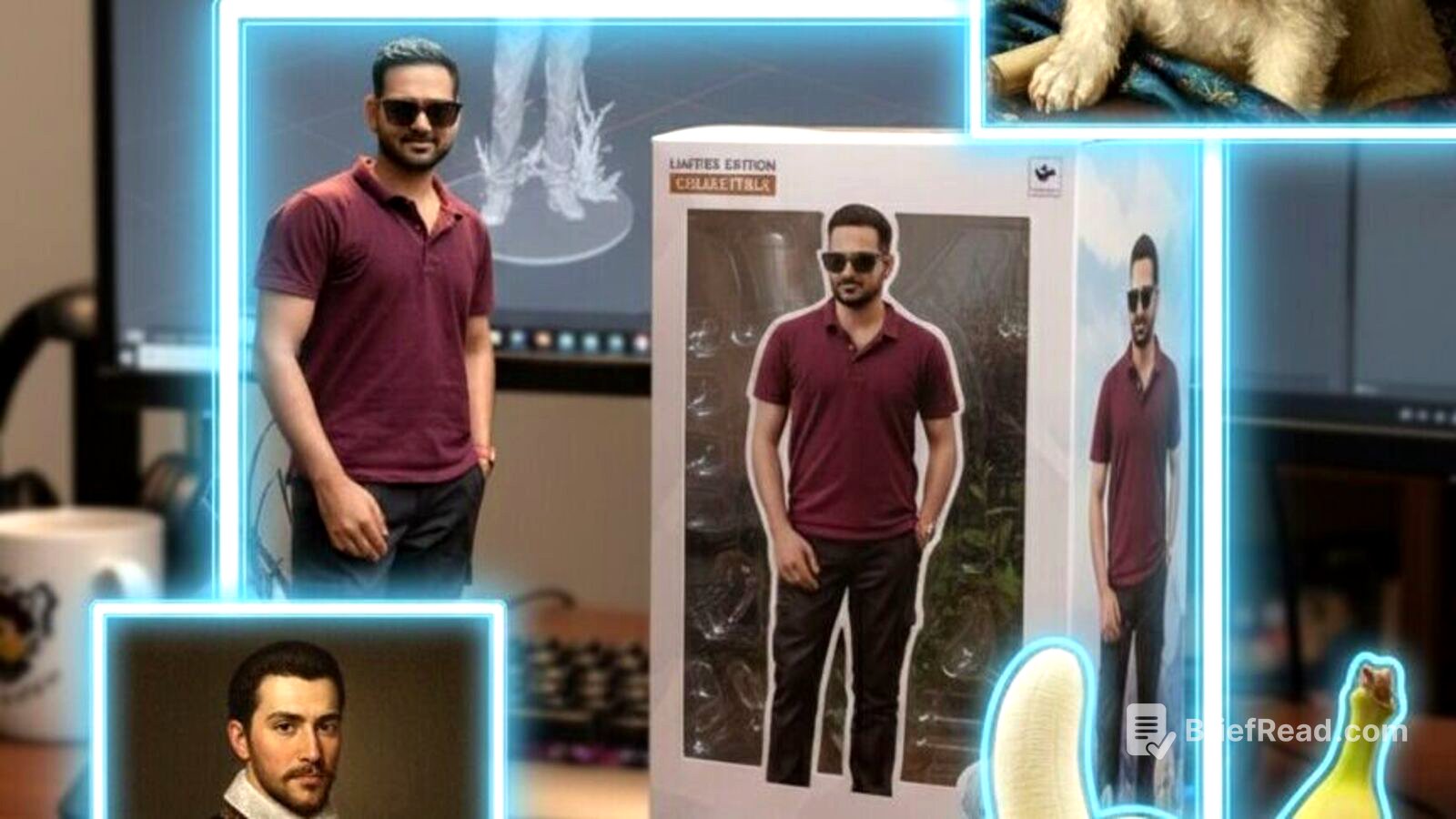TLDR;
Alright, so this video is all about Muadh ibn Jabal, a really special companion of the Prophet (peace be upon him). Muadh was super knowledgeable, like the go-to guy for halal and haram, and the Prophet loved him a lot. He was sent to Yemen to teach Islam and was known for his generosity and devotion. Even though he died young, he left a big mark, and the video highlights his importance and what we can learn from his life.
- Muadh ibn Jabal's exceptional knowledge and status as a young scholar.
- The Prophet's deep affection for Muadh, including a unique exchange of love.
- Muadh's mission to Yemen, filled with guidance from the Prophet on teaching and judging.
- His generosity, piety, and the impact he had on those around him.
- The lessons from his life, especially for young people to pursue knowledge and devotion early.
Introduction: A Companion Like Musa [0:00]
The speaker introduces Muadh ibn Jabal as a companion of the Prophet (PBUH) who reminds him of Musa (Moses) because of his personality and ability to captivate people. He shares an account from Damascus where a young, handsome, and knowledgeable man was the final word in any scholarly discussion. This man was Muadh ibn Jabal. Another account describes Muadh surrounded by people, with light and jewels seeming to come from his mouth as he spoke.
Early Life and Acceptance of Islam [8:37]
Muadh was a young boy when the Prophet (PBUH) received revelation. He was known for his tall stature, handsome appearance, wheatish complexion, curly hair, big eyes, broad shoulders, a slight limp, and a beautiful smile. He was popular among the youth of Medina and known for his intelligence. Muadh embraced Islam early, prior to the Prophet's arrival in Medina, and his mother also converted. He was among the 70 who pledged allegiance to the Prophet in Mecca.
Friendship and Early Da'wah [12:31]
Muadh's best friend was another Muadh, from the same tribe. Together, they played a trick by throwing the idol of the tribe's chief into a dumpster, which eventually led the chief to embrace Islam. Muadh had a strong personality and was active in calling the youth to Islam. He debated with the People of the Book, questioning their rejection of the Prophet (PBUH) despite their prior knowledge of his coming.
Close Relationship with the Prophet (PBUH) [16:12]
The Prophet (PBUH) recognized Muadh's potential and kept him close, investing in his knowledge. Despite his young age, Muadh was treated like an adult and made a brother to Abdullah ibn Masud, a prominent figure from Mecca. Muadh participated in every battle alongside the Prophet and became distinguished for his knowledge, especially of the Quran. The Prophet (PBUH) said that Muadh was the most knowledgeable person in the ummah about halal and haram.
Mufti and Scholar [21:31]
Muadh had the rank of giving fatwa (legal rulings) during the Prophet's lifetime. The Prophet (PBUH) frequently praised him, and he was considered one of the muftis among the companions. He wasn't shackled by his age and demonstrated maturity beyond his years. People often narrated hadiths with Muadh sitting behind the Prophet on a donkey or camel, with the Prophet's hand on his chest or knee.
Hadith Narrations and Advice from the Prophet [24:45]
Muadh narrated many hadiths, often while riding behind the Prophet (PBUH). In one famous hadith, the Prophet (PBUH) asked Muadh if he knew Allah's right upon His slaves, which is that they worship Him without ascribing partners to Him, and their right upon Allah, that He will not punish them. The Prophet (PBUH) also advised Muadh to be mindful of Allah, follow up a sin with a good deed, and treat people with good manners.
Learning and Guidance [33:44]
Muadh was still learning and growing, sometimes showing overzealousness. He was once criticized for reading long surahs in prayer, causing hardship for the people. The Prophet (PBUH) advised him to be mindful of the people's capacity. Muadh also narrated the stages of prayer and fasting and was present when alcohol was prohibited. He narrated details about the nullifiers of wudu and salah and the Prophet's salah in battle.
Night Prayer and Devotion [39:54]
Muadh was known for his love of the Quran and his night prayer. He would say a beautiful dua at night, acknowledging Allah's ever-living and sustaining nature, and expressing his slow progress in fleeing Hellfire and seeking Paradise. He confessed that he had little to present except his witness that there is no God but Allah and that Muhammad (PBUH) is His messenger. Muadh also sought reward from Allah for his sleep, intending to gain strength to wake up and pray.
Teaching in Mecca and Correcting Umar [44:31]
After the conquest of Mecca, the Prophet (PBUH) put Muadh in charge of teaching the people the religion. Muadh, a young man from Medina, was responsible for teaching the people of Mecca, just as Musab, a young man from Mecca, had taught the people of Medina. Muadh even publicly corrected Umar on a judgment, which Umar welcomed, praising Muadh and acknowledging that he would have been astray without him.
Dispatch to Yemen and the Prophet's Advice [48:35]
The Prophet (PBUH) dispatched Muadh to Yemen to teach Islam. Before sending him off, the Prophet (PBUH) helped Muadh with his debts, as he was very generous and often gave away his wealth. The Prophet (PBUH) took Muadh's hand and said, "I love you." He then advised Muadh to say at the end of every prayer, "Allahumma a'inni ala dhikrika wa shukrika wa husni ibadatik" (O Allah, help me to remember You, to thank You, and to worship You properly).
Guidance for Judging and Teaching [53:37]
The Prophet (PBUH) asked Muadh how he would judge if put in a position to judge. Muadh replied that he would start with the Book of Allah, then the Sunnah, and if he couldn't find it there, he would use his best opinion. The Prophet (PBUH) put his hand on Muadh's chest and praised Allah for helping the messenger of the messenger of Allah. He also advised Muadh to give people glad tidings, make things easy for them, and cooperate with one another.
Methodology in Da'wah [56:33]
The Prophet (PBUH) instructed Muadh that he was going to people of the Book (Christians) and should first call them to bear witness that there is no god but Allah and that Muhammad is the Messenger of Allah. If they followed that, then inform them of the five daily prayers, and if they followed that, then inform them of zakah, taken from the rich and given to the poor. He also warned Muadh to fear the dua of the oppressed.
Farewell and Prophecy [59:57]
As the Prophet (PBUH) walked with Muadh to the outskirts of Medina, he told him that this might be the last time they see each other and that Muadh might return to find only his grave. Muadh wept, and the Prophet (PBUH) turned back towards Medina, saying that the people closest to him are the people of taqwa (piety), wherever they are. He sent Muadh off with prayers for protection and advised him to show people only the best of his manners.
Muadh in Yemen and Later Life [1:07:00]
Muadh arrived in Yemen, and the people loved him. He led them with good and gave da'wah, and many embraced Islam. After the Prophet's death, Muadh remained in Yemen. Later, he moved to Syria and became a prominent scholar. Umar said that if he were to appoint a Khalifa, he would choose Abu Ubaidah, and if Abu Ubaidah had passed away, he would choose Muadh, because the Prophet (PBUH) said that Muadh would be raised among the scholars with a degree of separation on the Day of Judgment.
Generosity and Trials [1:11:06]
Umar tested Muadh's generosity by sending him 400 dinars, which Muadh immediately distributed among the poor. Umar praised Muadh and Abu Ubaidah as brothers cut from the same cloth. During the plague of Amwas, Muadh lost his two daughters, two sons, and his wife. His son Abdulrahman recited a verse of the Quran, affirming that the truth is from Allah and not to be among the doubters.
Death and Legacy [1:18:45]
As Muadh was dying, a man cried because he would no longer benefit from Muadh's knowledge. Muadh told him not to cry and directed him to seek knowledge from Abdullah ibn Masud, Salman al-Farisi, Abu Darda, and Abdullah ibn Salam. Muadh's last words were, "You know, O Allah, that my heart loves You, so go ahead and take my soul." He was only 34 years old when he died.
Muadh: An Ummah in One Person [1:21:03]
Abdullah ibn Masud compared Muadh to Ibrahim (Abraham), saying that Muadh was an ummah (nation) in one person, devout in his worship to Allah and not from those who attributed partners to Allah. He defined an ummah as someone who teaches people goodness and a devout worshiper as one who follows Allah. The speaker emphasizes that Muadh's example shows that we should not wait to pursue our Lord and that young people should get a head start.









